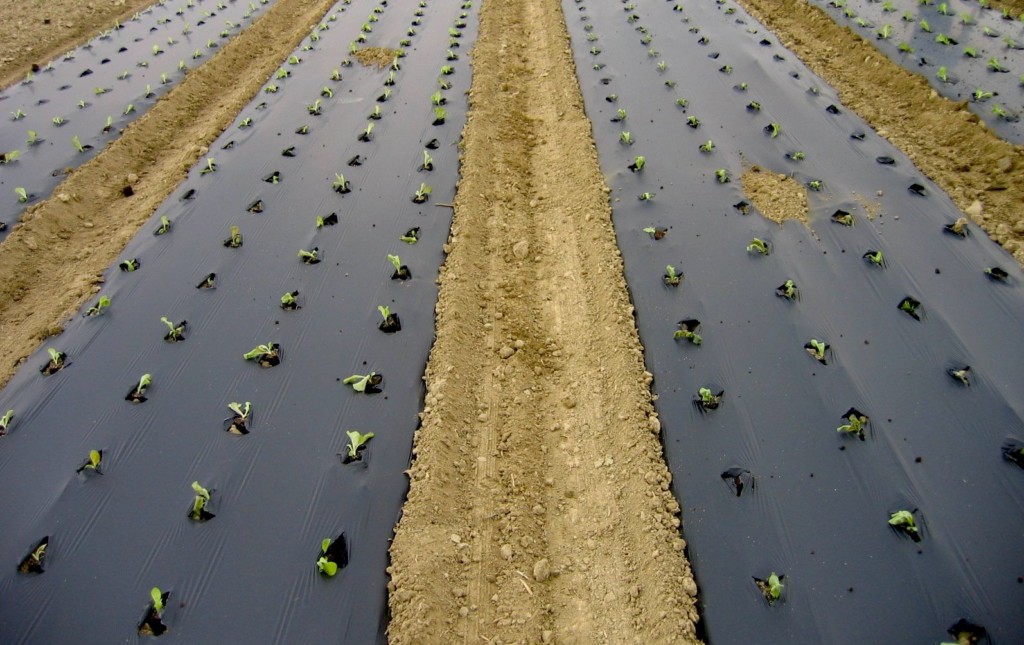
Biodegradable mulch film © European Bioplastics
Berlin, 5 October 2017 – In the light of the upcoming vote of the European Parliament on the revision of the EU Fertilizers Regulation, European Bioplastics (EUBP), the association for the bioplastics industry in Europe, calls on the Plenary to confirm what has been approved by the Parliament’s Committees on Internal Market and Consumer Protection (IMCO), on Agriculture and Rural Development (AGRI), and on the Environment, Public Health and Food Safety (ENVI) in July earlier this year. In their reports, the Committees acknowledged the innovative potential of biodegradable mulch films to provide positive agronomical effects and to help avoid the accumulation of microplastics on fields.
Biodegradable mulch films have been available on the market for more than 20 years, backed by solid scientific and technical knowledge, and meeting a high level of acceptance among European farmers growing fruits and vegetables. They play an essential role in modern agricultural practices, especially considering that conventional plastic films generate about 80% of the agricultural plastic waste. For thin film applications such as mulch films the plastic waste collection is almost impossible, and as a result a significant part stays in the fields. Even if collected, the film waste is highly contaminated with soil, sand, and organic material, by up to 60-80% in weight of the total amount sold, making mechanical recycling economically unviable [1]. Because of these difficulties in the recycling process, in the Spanish Region of Andalucía, for example, the thin films of plastics used in agriculture are no longer collected or recycled [2].
Therefore, a level playing field for these materials in the EU is much needed, as the situation is far from being uniform among Member States and even between the different regions of a single country. This situation poses a barrier to the creation of an EU single market for bio-based and biodegradable materials, which would contribute to the EU’s innovation in agriculture goals. The inclusion of biodegradable mulches in the EU Fertilizers Regulation, with a clear link to the criteria of the upcoming European standard for the biodegradation of plastic mulch films in soil, will help to harmonise regulations across the EU Member States. The standard is expected to be published by the end of the year and will require complete biodegradation as well as an eco-toxicity test [3].
For more information, please see the following papers and expert statements:
- Joint Position Paper of European Bioplastics and EuropaBio concerning the EU Fertilizers Regulation and biodegradable mulch film (2017) (Download)
- Organic Waste Systems (OWS) expert statement on biodegradable mulching films (2017) (Download)
[1] Plasticulture: “Economic and environmental impacts of soil contamination in mulching films”, 2016. Pages 40-46 http://plasticulture.qualif.e-catalogues.info/#46
[2] http://www.teleprensa.com/almeria/el-campo-almeriense-vive-una-delicada-situacion-porque-cicloagro-no-esta-retirando-el-plastico-fino.html
[3] The current draft (prEN 17033) has already been published by some National Standardization Bodies in Germany, Austria, and France.
Downloads:
Press statement (english) ‘Revision of EU Fertilizers Regulation: Why we need biodegradable mulch films’ 5 October 2017, (PDF) download
Photo: Biodegradable mulch films (c) European Bioplastics (JPG) download